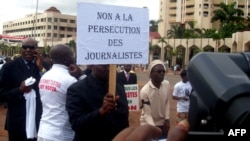Journalists in Cameroon are marking World Press Freedom Day (May 3) with calls for government troops and rebels to stop abusing reporters covering the separatist conflict. Cameroonian media groups say at least 80 journalists have fled from the country's troubled western regions because of threats to their safety.
Lambert Kehven, 36, is a baker in Cameroon's capital, Yaoundé.
But two years ago, he was a reporter in Cameroon’s Northwest region for Canal 2 International, one of the country’s top TV stations, reporting on the separatist conflict.
Kehven says he decided to leave the area and his career after covering an attack on a village that left scores of people dead, and homes burned.
But it wasn’t reporting on the brutality or violence that pushed him to flee.
Kehven says he was ordered by both the anglophone rebels and government troops to report lies.
"After intimidation at gunpoint, the fighters instructed me to report that the houses were burnt by the military," he said. "When I finally got to the site where the houses were burnt, the military equally ordered me, they ordered me to report that the houses were torched by the separatists."
Kehven says both the separatists and government troops demanded to read his reports before publication and threatened to kill him if he said anything negative about them.
Both Cameroon’s military and rebel fighters deny threatening or abusing journalists.
But Cameroon’s Union of Journalists says since the conflict began in 2017, separatists have abducted 16 journalists and four of them died in their custody.
Cameroon authorities blame separatists for attacks on 12 community radio stations in the western regions and forcing eight newspapers to close.
Meanwhile, the Cameroon Association of English-Speaking Journalists (CAMASEJ) says government troops are holding nine journalists that were reporting in the regions.
CAMASEJ says at least 80 journalists have fled the western regions, most to the cities of Douala, Yaoundé, and Bafoussam.
Ngah Christian Mbipgo is publisher of Cameroon's lone English daily newspaper The Guardian Post and president of the Cameroon Association of English Language Publishers.
He says his association assists journalists who flee threats from troops and the rebels, also known as Ambazonian or Amba fighters.
"The first thing you have to do is to talk to them, build them up psychologically, make them see the importance of regaining self-confidence and healing their minds," he said. "Sometimes we have gone to the extent of giving health assistance for those of them who may have suffered one or two attacks by either the military or Amba fighters. We offered some of them office space at the Guardian Post. They have access to the internet."
The Committee to Protect Journalists in February joined 26 groups in calling on Cameroon’s President Paul Biya to release all people detained for free expression, including four journalists.
Thomas Awah Junior, Mancho Bibixy, Tsi Conrad, and Kingsley Fomunyuy Njoka were arrested between 2016 and 2020 and are being held at Yaounde’s Kondengui Central Prison.
The four journalists were charged with terrorism and collaborating with separatists, charges they deny.
Despite the arrests, communication minister Rene Emmanuel Sadi claims the media is free in Cameroon but warns journalists against what he calls attempts to destroy the country’s image.
"Media men and women in Cameroon carry out their daily work in total freedom and independence. However, incitement to violence and hostility against the homeland is not tolerable in the rule of law and in a society of freedom and responsibility," he said.
The Cameroon Association of English-Speaking Journalists on World Press Freedom Day called on both rebel fighters and government forces to stop attacking journalists.
The separatists have been fighting since 2017 to carve out an independent English-speaking state in Cameroon’s Northwest and Southwest regions.
Cameroon’s English speakers complain of second-class treatment by the country’s French-speaking majority.




